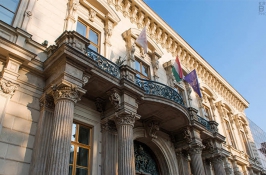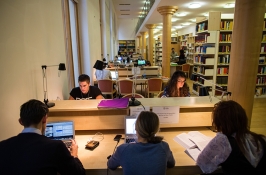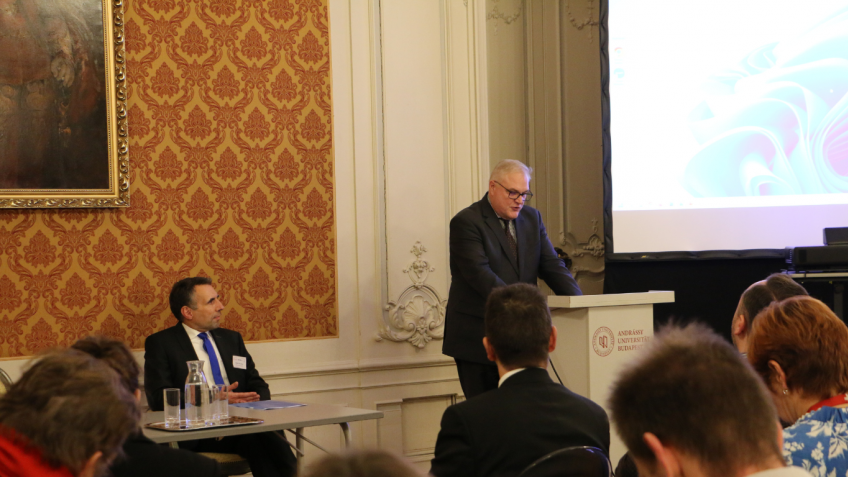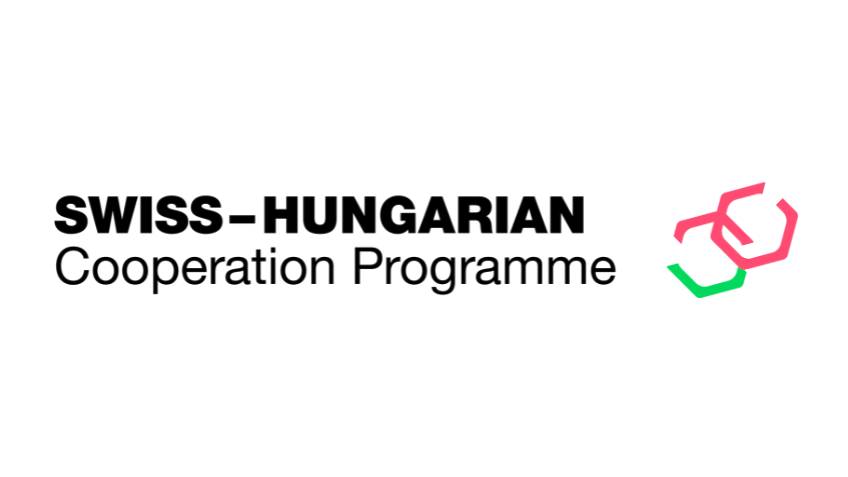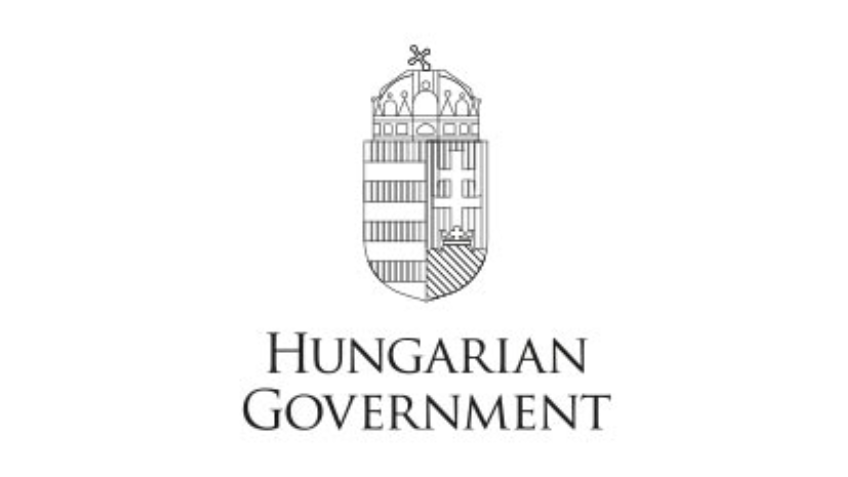The two-day event, which was organised with the support of the Swiss-Hungarian Cooperation Programme, focused on the role of small and medium-sized European states: How do they deal with the increasing challenges to their defence? How do they avoid being on the menu when they are not at the table?
In order to give these questions an appropriate academic discursive framework, a whole range of researchers from the Central and Eastern European region came together following the invitation of Dr András Hettyey from AUB.
Dr Robert Diethelm, who had worked in the Swiss Federal Department of Defence, Civil Protection and Sport for ten years, opened the conference by addressing the current global political situation. According to him, after years of being promised security by the USA, the European NATO members are slowly coming to the realisation that they need to become much more independent when it comes to defence. This is because Russia and China are now taking their place at the table of geopolitical players: with the new Silk Road, the People's Republic is making a significant political and economic contribution to international politics. However, China is also facing serious economic challenges, so it is quite possible that the country will grow old faster than it grows rich. In contrast, Russia is neither politically nor economically relevant internationally; even in the BRICS grouping, it would not be able to form a counterbalance, as there is no reliable basis for cooperation.
In his lecture, Christoph Schwarz from the Austrian Institute for European and Security Policy (AIES) shed light on the theory, history and current state of Austrian foreign policy, with a particular focus on its neutrality. Based on decades of work on Austrian constitutional law regarding neutrality and other regulations, the current challenge is how Austria can continue to support Ukraine to the extent it wishes while remaining neutral. The answer to this is the joint initiatives of the EU, through which Austria can contribute to supporting Ukraine while maintaining the fact that de jure it remains more or less neutral.
The second lecture was delivered by Tamás Csiki Varga under the title ‘Hedging’: An alternative explanation for Hungarian foreign and security policy in the 2020s. Csiki Varga highlighted Hungary's ambivalent security policy role, which involves contradictory rhetoric and actions vis-à-vis European and US policy. Since 2022, Budapest's actions have increasingly diverged from those of other NATO and EU members, leading to a growing misalignment with its allies. While Hungary continues to formally support NATO and the EU and largely supports the sanctions, it has not delivered any weapons or military equipment to Ukraine, but only provided humanitarian aid and helped the refugees who came to Hungary.
The third presentation of the panel was given by Zdeněk Kříž under the title ‘The Czech response to the Russian invasion of Ukraine - a strategy for small states?’. One of the most important findings of Prof Kříž's presentation is that small size does not equate to weakness. Kříž points out that the Czech Republic is a different example among medium-sized and smaller states, as it does not try to mediate or remain neutral in the conflict. Instead, the Czech Republic clearly supports Ukraine and shows its commitment to its cause. The Czech government is strengthening its relations with NATO and the EU and mobilising their support for Ukraine. As a small state with limited military capabilities, the Czech Republic plays a significant role in supporting Ukraine, with the Czech defence industry benefiting from this assistance.
The Slovenian perspective on the war in Ukraine was presented by Dr Marko Lovec from the University of Ljubljana under the title ‘Slovenia's response to the Ukraine war: pro-Western elites, anti-systemic society’. He pointed out that Slovenia's attitude to the war in Ukraine had changed and realigned itself as a result of elections. Under Janez Jansa's government (2020 - April 2022), strong support for Ukraine was announced at the beginning of the war, which was even compared to the Slovenian War of Independence. However, this course was not continued after the elections in April 2022, which brought about a change of government. From then on, Robert Golob led the new government, which continued to support Ukraine by all means, but a new course also emerged with defensive normativism, including more moderate rhetoric and a primary focus on humanitarian aid. This puts Golob in line with his electorate, which did not easily support the previous government's course. Consequently, according to Lovec's core argument, the Slovenian electorate's vote influenced Slovenia's willingness to provide support and softened it.
Following the Slovenian perspective, Dr Paul Popa from Babes-Bolyai University in Cluj-Napoca presented the Romanian view of the war. He explained that relations with Ukraine were ambivalent. The Bukovina region, which today belongs partly to Romania and partly to Ukraine, has frequently changed its affiliation in the past. Due to its history, many Romanians now live in the Ukrainian part of Bukovina, and feel treated badly by the Ukrainian majority. As a result, Romania is not as committed to supporting Ukraine as Poland, for example, despite its painful history under communism. Popa spoke of Romania's ‘guarded response’ to the war in Ukraine, referring to a behaviour that can be semantically described with the attributes ‘cautious’, ‘timid’ or ‘shy’.
The second panel was concluded with an insight into a group of countries that all have similar attitudes towards the war in Ukraine. The group consists of Moldova, Georgia, Armenia and Azerbaijan. They were presented by Seraina Eldada from the Geneva Centre for Security Policy and Johnny Melikyan from the Orbeli Center in Yerevan.
According to the two experts, these states are the ‘frontier states’ of Europe par excellence, living in a similarly dangerous situation as Ukraine. Eldada and Melikyan emphasised that the group of states fear falling into a grey area between Russia and the West, which would be detrimental to the consolidation of democracy in Armenia and Georgia.
In his presentation on Poland, Zsombor Zeöld from Corvinus University Budapest emphasised that Polish security policy prioritises four strategic directions. Firstly, the Baltic and Nordic states, secondly Germany, thirdly Ukraine and finally the USA. The USA is the most reliable supplier of Polish defence equipment, and Poland has a vested interest in linking its own security policy with the US Grand Strategy. This may lead to some strategic dilemmas in the future with regard to a developing European Grand Strategy. So far, however, according to Zeöld, the US military has favoured a strong Polish-German backbone to counterbalance Russian aggression in Eastern Europe.
This event was organised within the framework of the Changing Orders Research Programme, a comprehensive project supported by the Swiss Contribution with the national co-financing of the Hungarian Government.
Sarah HESSE, Fruzsina GERMUSKA, Simon TAFLER, Joel KELLER, András HETTYEY



 ETN
QuickLinks
Contact
ETN
QuickLinks
Contact
 Start Your Studies!
Scholarships
Degree Programmes
PH.D. Programme
Admission
Alumni Association
Start Your Studies!
Scholarships
Degree Programmes
PH.D. Programme
Admission
Alumni Association
 Subscribe to our newsletter
Subscribe to our newsletter
